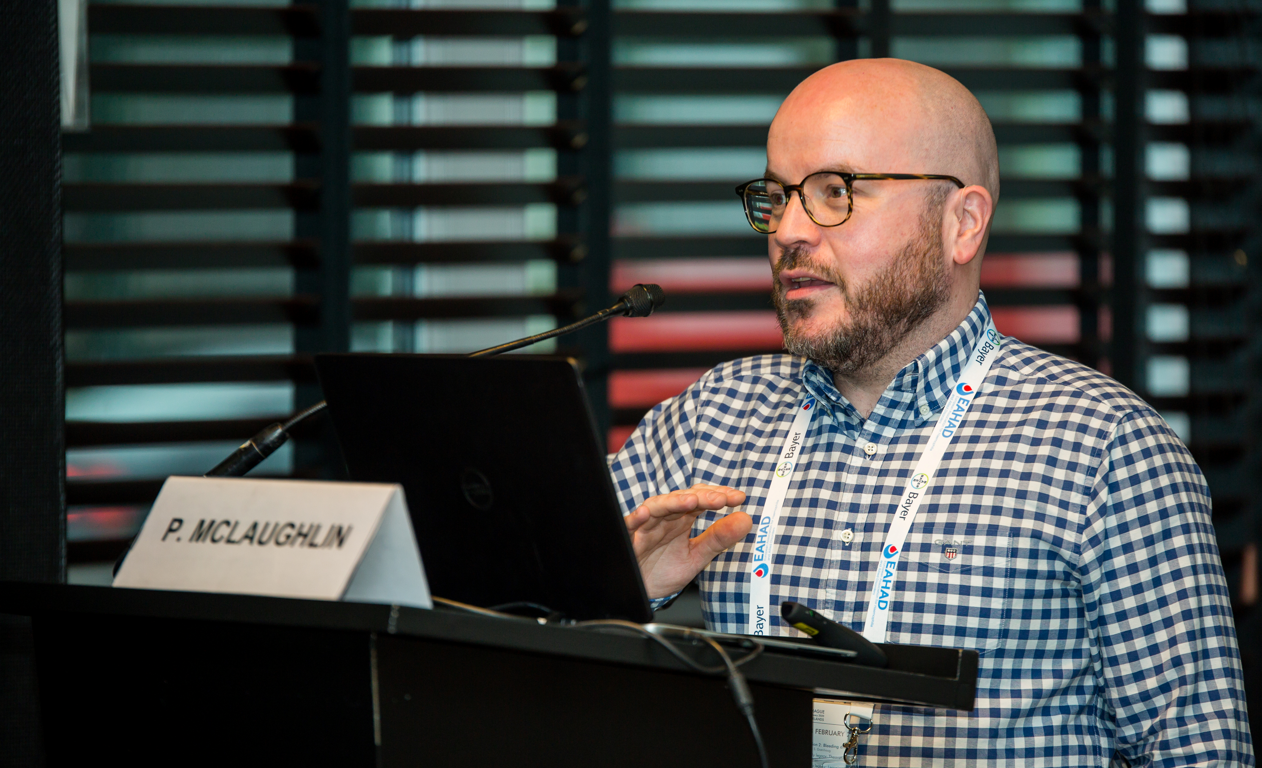This past February, Paul Mclaughlin became the new Physiotherapists Committee Chair, taking over from Dr David Stephensen. We recently had the opportunity to talk with our new Committee Chair and asked him among other things about his background, his plans for the future, as well as the challenges associated with physiotherapy in haemophilia and bleeding disorders in Europe.
Could you tell us a bit more about yourself?
After completing my undergraduate physiotherapy degree in Belfast, Northern Ireland, I worked for a few years in Manchester and then life and work took me to London. I worked in a variety of specialties before deciding that musculoskeletal care was the thing that interested me most. I did my Master’s degree in neuromusculoskeletal rehabilitation and this is where my interest in clinical research really started. I love being a physio as it works very well with my tendency to chat (a lot!) – and so spending time with patients (and colleagues) and getting to know what makes them tick. I am currently completing my PhD Fellowship which has been focused on developing an exercise based rehabilitation intervention for managing chronic pain associated with haemophilic arthropathy.
How did you get involved in haemophilia treatment?
As with most physios in haemophilia – I think it was more a serendipitous ‘being in the right place at the right time’ that gave me the chance to work in haemophilia. A colleague who was working in haemophilia had to take some time away, so I covered the role for a few hours a week. As time went on, I got a chance to increase the hours I was doing in the service up to 2-3 days per week. With the support of the centre, we were able then to get the physio post up being full time – and we haven’t looked back. It is without doubt, the best physio job I have ever done, and feel very lucky to have had the opportunity to be in this job, best decision ever!
What initially gave you the motivation to join the Committee?
I am fortunate enough to be able to say I was one of the original ‘gang’ of physios who thought this committee business was worth pursuing! It was lots of discussions over beers after congresses together with Piet De Kleijn, Sébastien Lobet and David Stephensen, formulating a plan to get the bones of the Physio committee up and running. The motivation was really just trying to get into a position where we could highlight the benefits of physiotherapy in haemophilia and to enable a network for like-minded people. We had support at every aspect from lots of people, particularly at EAHAD – and it was definitely worth the effort. The committee has grown and evolved over the past few years which has been amazing to see and be part of that.
In your opinion what is the biggest achievement of the Committee so far?
I think it is how cohesive the committee is, and how we have managed to garner interest and support from haemophilia physios across Europe. Having a group with shared interests, shared purpose and an overall desire to push the quality of physio care forward is a superb achievement in a relatively short space of time. It shows just how much people want things to change for the better in what we can provide for people with inherited bleeding disorders. The committee has also been involved more with the European Haemophilia Consortium as well in the past couple of years – which should make things even better for the future.
You will be the Physiotherapists Committee Chair for the next two years. What are your plans for the Committee going forward?
We want to be a position where the upcoming Principles of Care document for Physiotherapy, co-produced with the EHC, will be published and be used to push for better physio care for people with bleeding disorders. Ultimately we want to try and see if an educational or competency framework can then be developed that works alongside the principles of care document.
What would you like to see next year at the EAHAD 2023 Allied Health Professionals Day, in Manchester, UK?
I want to see more opportunities for Allied Health Professionals to be able to present their research ideas and research activities to their peers and colleagues. I would like to include a more interactive session designed around the ‘How and Why’ of developing a research idea, using the expertise of those already in our EAHAD physiotherapy group. The AHP day has been a fantastic addition to the annual EAHAD congress and stands out as a being very progressive, when compared to other haematology congresses.
What do you think is the biggest challenge for a physiotherapist specialising in haemophilia care today?
I think for many it is being able to have enough ‘protected’ hours in haemophilia care to allow them to develop the services and interventions that they know they can do. An integrated, appropriately funded haemophilia physiotherapy service can bring immense benefits to people with bleeding disorders, and it is in everyone’s best interest (clinicians and patient advocacy groups) to work together and apply pressure for the development of such services.
Outside of your work, what motivates you? Do you have any hobbies?
I enjoy cycling and running. I am an avid reader, anything really – political history, autobiographies, science, comedies – anything! Although I do have a particular fondness for the older classic Agatha Christie novels as well for a bit of over the top drama. It’s good to read – it lets your mind decompress and gets you mentally wandering through someone else’s storytelling – the best thing.

